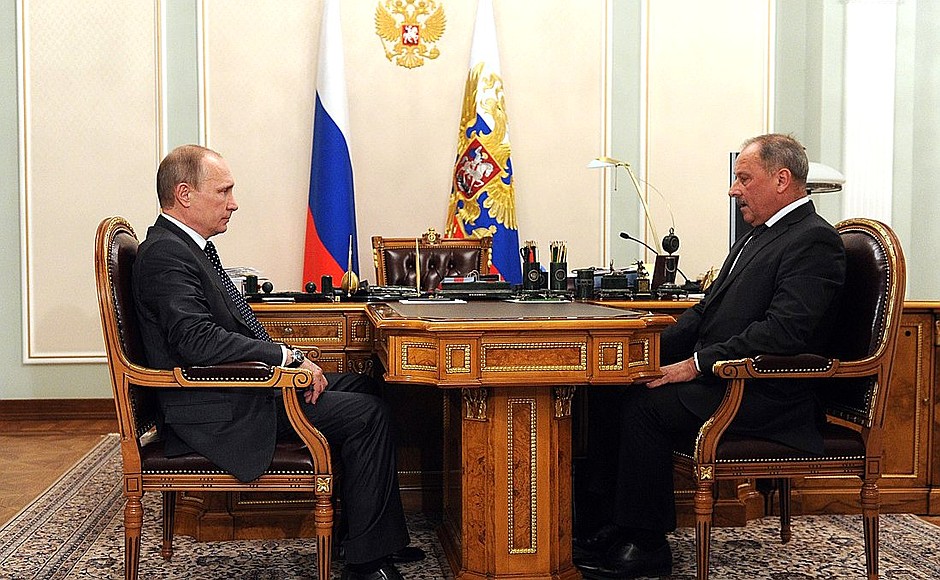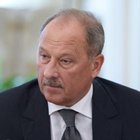
President of Russia Vladimir Putin: Good afternoon.
Mr Dmitriev, Vnesheconombank is taking part in implementing the Government’s sustainable economic development programme. I would first like to hear about what the bank is doing in this area.
Second, the bank was established as a development institution, above all for work in the economy’s real sector. I know you have many projects and I would like to discuss them too.
Chairman of Vnesheconombank Vladimir Dmitriev: We are indeed involved in the anti-crisis programme. Under this programme, we will lend to the economy’s real sector and at the same time receive substantial financial support from the state, taking into account the external restrictions we currently face, and what are, frankly speaking, only limited possibilities for borrowing on the domestic market. We are thus receiving state support through several channels, from the Finance Ministry and through the National Welfare Fund.
Last year, we received a capital injection of 30 billion rubles from the Government. We are likewise grateful to the Central Bank for substantially expanding their support measures for us. They have expanded credit volumes, raised the limits, and included us in the refinancing programme on a par with the state-owned and private commercial banks.
At the same time, I want to say that we are continuing to finance the real sector. Decisions were taken on this matter last year and this year, and the bank and our supervisory board consider this one of the priority tasks. This is all the more so as our priorities include key projects that will help to bring about a recovery and will modernise the economy, help us to replace imports, and reinvigorate the industrial sector.
In this respect, I particularly note that many companies facing difficulties arising from the crisis and the shrinking opportunities for borrowing to finance their working capital are asking us to support them and help them to restructure their debts. We are responding to their calls and are not raising interest rates.
Vladimir Putin: You mean on loans made earlier?
Vladimir Dmitriev: On earlier loans and loans we are issuing now. In other words, we are essentially building up losses at some point down the road, but this is a conscious choice in order to make it possible for businesses to develop their potential and continue their investment projects.
At the same time, we are working in the knowledge that the state authorities have declared that they will support Vnesheconombank through the National Welfare Fund and through preferential lending rates with the Central Bank. This will do something to compensate for the temporary losses we face in continuing to issue ruble-denominated loans at an interest rate of 11 percent and foreign currency loans at the interest rate that was agreed when the loan agreements in question were concluded.
VladimirPutin: Which projects in particular would you mention?
Vladimir Dmitriev: I think one of the important projects is the loan to AvtoVAZ for its new production expansion programme, which will result eventually in full localisation of engine production here. In particular, all Renault cars made at the AvtoVAZ facilities and facilities in Moscow will be equipped with 1.6-litre engines produced here in Russia.
There is also Ford Sollers’ big programme to build facilities and localise engine production here, and then there is the KamAZ programme, into which we have already invested tens of billions of rubles. We just recently received a request, which we are currently examining, for another 35 billion rubles to buy bonds issued by KamAZ for new production.
In the modern high-tech sector, there is the company T-Platforms, which is a key business in producing software for supercomputers, and there is a number of businesses in the aircraft manufacturing industry and of course Sukhoi Civil Aircraft Company.
In this respect, I want to note the debt restructuring measures and financial support measures for Sukhoi and Sukhoi Civil Aircraft Company, along with the other measures that Vnesheconombank is taking to support promotion of their products on markets abroad. We were happy to see the amount of resources and goods delivered to Mexico, and these kinds of deliveries are expanding.
We see that the system of comprehensive support for industrial exports is working well now. It is through this system that the Sukhoi Superjet aircraft is being sold abroad. VEB-Leasing is at work in this area, and so are EZIAR – Export Insurance Agency of Russia, and Eximbank of Russia. This entire construction is fully operational now.
We have decided to set up a special centre to support industrial exports, which will involve the institutions I just mentioned and will have new powers, so that we can provide in full a one-window system for Russian exporters ready to receive state support through the existing financial institutions, including VEB and the institutions I just mentioned.
Of course, in the context of import replacement and in terms of ensuring our economic security and self-sufficiency, in the produce sector above all, the agribusiness projects that we are crediting are also very important.
Vladimir Putin: There is the food processing sector too…
Vladimir Dmitriev: Yes, this includes meat and poultry processing. We recently signed a new loan agreement for financing a project that Miratorg is carrying out.
Their project is for a top-class beef production business using the latest technology and capable of producing around 120,000 tons of marbled beef. Production has already started and we plan to continue lending for this project.
The loans in this particular case are foreign currency loans, as they are needed for purchasing top-quality livestock, and the total money involved will come to slightly less than $2 billion.
But this is an important business that uses the most advanced equipment and includes slaughterhouse and production facilities of the latest standards, and there is demand for such facilities in practically all parts of the Central Federal District.
Vladimir Putin: Good.
<…>
